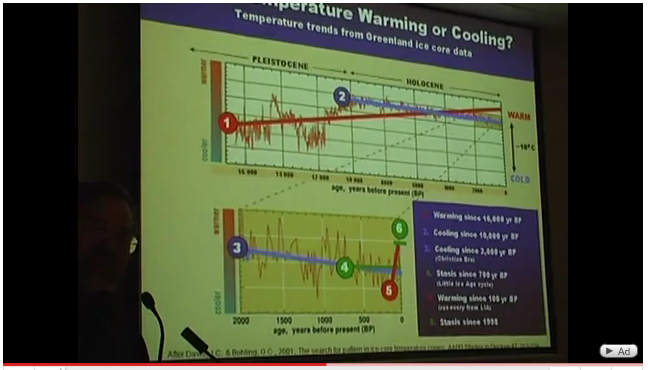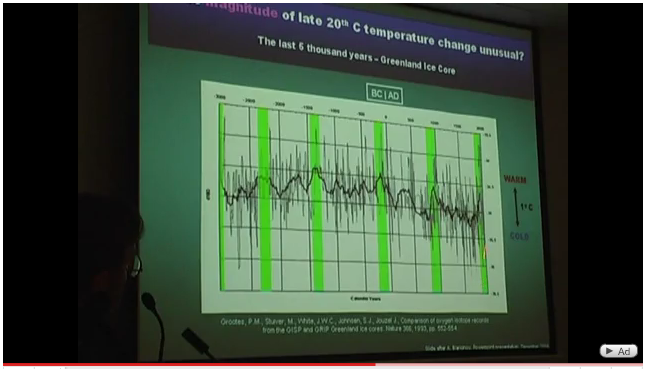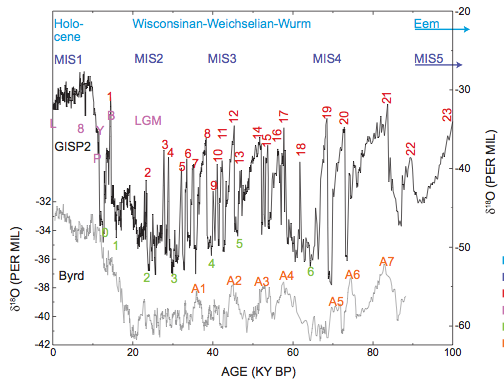Crux of a Core, Part 2 - Addressing Dr. Bob Carter
Posted on 9 March 2011 by Rob Honeycutt
In Part 1 of this article I responded to Dr J Storrs Hall's misrepresentations of the GISP2 data, where I laid out the essential error of conflating a local temperature record with global average temperatures. As well, I laid out the current understanding of mild Holocene cooling as presented by Miller 2010, which uses multiple temperature sets to understand global temperatures.
Now I'm going to look at another wide-spread misrepresentation of the GISP2 data coming from Bob Carter. Dr. Carter hails from Australia and has a background in paleontology, stratigraphy, marine biology, and environmental science. He also is a science advisor for Science and Public Policy Institute (SPPI) along with Monckton, Willie Soon, and others. He shows up frequently in the press and there are a great many re-publications of his lectures on Youtube that get large numbers of views.
Bob Carter frequently lectures on climate change as a "skeptic" claiming that there is nothing to worry about. He says current warming is natural and is nothing out of the ordinary. In his lectures Carter makes extensive use of the same GISP2 data that was used by Dr Hall, only Carter's errors, given his background in this field, appear to be much more egregious.

Fig 1: Screenshot of Carter lecture showing 6 time frames for warming and cooling
Here in Fig 1 Carter points to various time scales related to GISP2 over the past, and like Hall, he gives no indication that this is one local temperature record. He merely presents it as a global proxy. His claim is that whether the planet is warming or cooling is just a matter of where you choose to look in the record. Yet again, we have someone conflating a local temperature with global averages. The overall data series is GISP2, but Carter's series 5 and 6 come from the modern global average temperature data (though Carter does not provide any reference other than GISP2). We already know that points 5 and 6 are not from GISP2 because that data series ends around 1850.
If Bob Carter were honestly trying to understand the Greenland temperature, he would make the attempt to reconstruct the modern temperature record in Greenland. Or, very least, he would attempt to compare high latitude temperature average to the GISP2 data. Or, if Carter were looking to give us a presentation on global temperature over the Holocene, he surely possesses the technical skills to combine a broad range of temperature series in order to present a clearer picture of the Holocene and compare that to the modern record. He does none of these.

Fig 2: Screenshot of Carter lecture addressing the Holocene
Next Carter drills in closer to the Holocene, presenting here, according to the title of his slide, the past 5,000 years. Carter is making the claim that there have been numerous clear warming periods during the Holocene, which are identified by the green bands. At the bottom of the slide he cites a paper which I assumed, as one normally would, that the chart being presented comes from the paper he's citing. This took some effort to track down because it's not very clear from the video.

Fig 3: Paper citation for the graph
What I managed to make out is that the citation is for Grootes 1993, a paper titled Comparison of oxygen isotope records from the GISP2 and GRIP Greenland ice cores, published in Nature, 366, pages 552-554. I went to the Nature website and purchased a copy of the paper expecting to find the chart Carter is presenting. It's not there. There is nothing resembling Carter's chart in this paper. There is only brief mention of the Holocene in the paper, one in the abstract to say, "Greenland has been remarkably stable during the Holocene, but was extremely unstable for the period representing the rest of the core."
We can follow this for a moment though. GRIP and GISP2 are two separate ice cores drilled on the Greenland summit. The locations for the two projects are less than 20 miles from each other (Fig 4). Therefore, these two records of temperature are little more than a corroboration of each other. These are not two distinctly different temperature records.

Fig 4: GRIP and GISP2 locations.
Any changes in the climate record need to have a mechanism for the change. Even natural warming or cooling occurs for a reason. In a local record, like GISP2, many of the larger changes prior to the Holocene are offset by the Byrd ice core in Antartica (Alley 2000, Alley 2010) shown in Fig 3. Other blips in the GISP2 record are a function of local physical events like snow drifts (Alley 2000). In this there is no way to infer from GISP2 alone that any rise or fall in the record is a function of global temperature changes without looking at a wider range of site records.

Fig 5: GISP2 and Byrd ice core records offsetting events (Alley 2010)
But again, this is relative to the time period prior to the Holocene. Grootes 1993 proceeds to state that, "The Holocene is a period of relatively stable climate in both cores with mean O18 values of -34.7 and -34.9 for GISP2 and GRIP respectively. The small Holocene O18 fluctuations of 1-2 occur too frequently to allow an unambiguous correlation between the cores." This directly contradicts the assertions that Carter makes suggesting that there are clear warming periods in the Holocene record evidenced by GISP2 and/or GRIP. The case can be made, looking at multiple lines of evidence, that the Holocene has cooled 1–2°C over the past 6,000 years (Miller 2010), but any inference about global temperatures made from Greenland alone can not be supported.
As I've stated in previous articles here on Skeptical Science, I'm not a scientist. At best I'm a spectator and enthusiast regarding climate issues. I have a great deal of respect for people who have put in the great effort required to achieve a PhD in their chosen field of study. These are the people society looks to as experts, the people who have the deepest understanding of a subject matter. But when I can spend a few days researching a presentation like Dr Carter's and identify gaping holes in his claims, this causes me a great deal of concern.
Science is merely the collective knowledge of the human race. We have a very serious problem when the knowledge we hold is so obviously misrepresented by those whom we should trust to convey that knowledge.































 Arguments
Arguments























 0
0  0
0






Comments